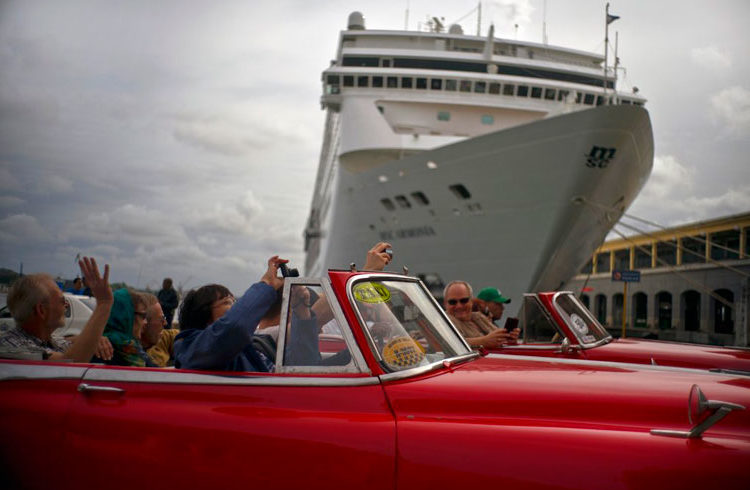The Trump administration’s restrictions and warning about traveling to Cuba have not convinced several U.S. travel agencies and organizations, which continue promoting visits to the island.
In a Fox News feature, heads of these agencies said that the Department of State has not contributed proof that Americans are at risk when traveling to Cuba.
“There is no proof about a sonic or any other attack. There have been no travel warnings for any other country,” affirmed Bob Guild, vice president of Marazul Tours, one of the oldest U.S. agencies specializing on travel to Cuba.
Guild and representatives of other companies commented to Fox that in a recent meeting with Department of State officials they had not received any new and convincing information about the alleged attacks suffered months back by some 20 U.S. diplomats in Havana.
“We want more information about who these persons were, how they were affected and how they are now,” said Guild, who added that they had not been given “specific information.”
Americans’ trips to Cuba increased with the reestablishment of bilateral relations during the Barack Obama government. In 2016 close to 285,000 Americans visited the island, a figure that rose to 619,000 last year.
If the more than 450,000 Cuban-Americans who also arrived in Cuba were added, the total amounts to more than 1.7 million Americans: a 191 percent growth in relation to 2016.
These figures were reported despite the fact that President Trump strengthened the regulations to travel to the island after the alleged attacks against his country’s officials who suffered symptoms like headaches and loss of hearing. The travel warning issued then by his government for Americans to travel to Cuba changed two weeks ago. The Department of States proposes “reconsidering travel” to the island.
“We do not accept the original travel warning,” said Guild, who believes that the current recommendation is still unjustified.
No complaints
Other travel to Cuba organizations commented that they have received no complaints from the Americans who visited the island with their help.
“We believe Cuba continues being an exceptionally rich and moving travel destination, and the door to travel there is still open,” said Chase Poffenberger, executive vice president of the educational travel provider Academic Travel Abroad.
“We have had an exceptional success with our programs in Cuba,” he commented to Fox News. “The reports by travelers have been notably positive and inspire us to continue doing what we do.”
The Cuban authorities have questioned the alleged attacks against U.S. diplomats and have suggested that the Trump administration is using them as a pretext to undermine the rapprochement between the two countries during the Obama government.
Last September, in the midst of the growing tension between the two countries, the American Association of Cuban Tour Operators, which represents more than 50 companies that operate on the island, said in a press release that no visitor from its country had suffered “acoustic attacks” on the island.
In a Senate Foreign Relations Committee hearing in early January, Department of State officials said they were not sure that sonic attacks had occurred and handled other hypotheses, like those of a virus. They also recognized that more than a year after the first reported incidents, the U.S. government doesn’t know who is responsible.
Tourism on the rise, private sector not so much
Half a year after President Trump froze the rapprochement between the United States and Cuba with the alleged idea of pressuring the island’s government to promote a political change and benefit the incipient private sector, his intentions seem to be out of step.
According to figures by the Cuban authorities which AP had access to, in 2017 a record 4.7 million visitors was registered – an 18 percent increase in relation to 2016 -, and more than 3 billion dollars entered the country thanks to tourism, the major part by the state-run sector.
On the other hand, many owners of private restaurants and accommodations reported lows in their businesses. The statistics indicate that only 34 percent of the tourists, without specifying nationality, stayed in the 24,000 private rooms registered in Cuba.
“With the announcement of the rapprochement by President Obama and during the following months, there was a tourist boom. You could see them everywhere,” Rodolfo Morales, a 74-year-old retiree who complements his pension with the renting of his rooms, said to AP. “We neighbors called each other because we had no room for so many visitors…. Then it collapsed.”
According to Morales, this boom took place between December 2014 and mid-2017, but in the last six months he didn’t have a single American guest. The panorama got worse with Hurricane Irma, which affected the state-run tourist infrastructure and quite a lot of private accommodations.
Trump’s measures restricting individual trips was another hard blow, since many Americans who arrived through that means opted for staying in private rooms. According to an article in The Hill, around 35 percent of Cuba’s Airbnb guests came from the United States.
With and without Americans
For economist and academic expert on tourism José Luis Perelló, Trump was unable to close the gap of visitors that was opened with Obama, while he observed a new tendency in terms of trips to the island: the cruises.
More than half a million cruise passengers arrived in Cuba in 2017, compared to the 184,000 the previous year.










